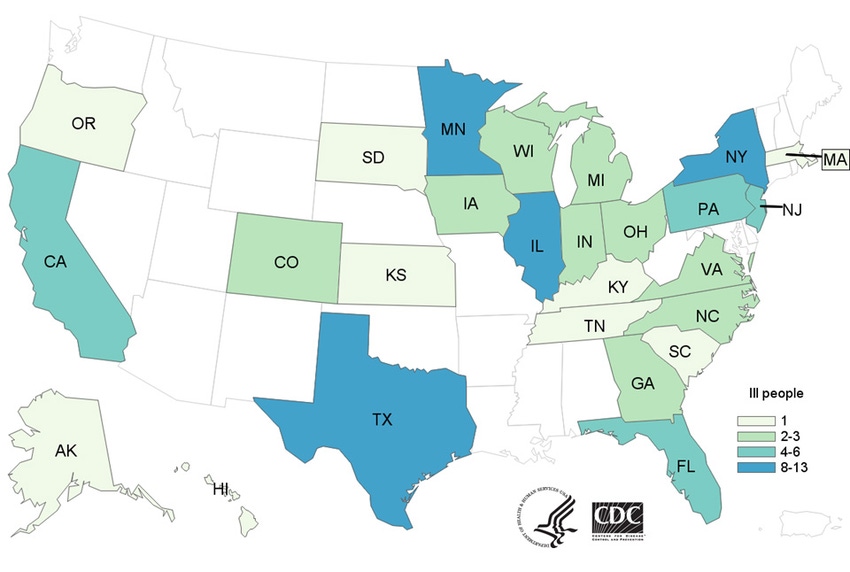Turkey industry reviewing salmonella control programs in all phases of turkey production.

The Center for Disease Control & Prevention and public health and regulatory officials in several states are investigating a multistate outbreak of Salmonella reading. Epidemiologic evidence suggests that raw turkey products and raw turkey pet food are possible sources.
No specific product, brand, facility or company has been linked to the illnesses, nor is CDC recommending that consumers stop consuming any turkey products. The U.S. Department of Agriculture’s Food Safety & Inspection Service (FSIS) is also monitoring the outbreak.
According to a CDC investigation update, 90 people from 26 states were reported to be infected with the outbreak strain of S. reading, 40 of whom have been hospitalized. However, no deaths have been reported.
CDC said the outbreak strain of S. reading has been identified in samples from raw turkey pet food in Minnesota, from raw turkey products from 19 slaughter and six processing establishments, as well as from live turkeys from several states. However, a single, common supplier of raw turkey products or of live turkeys has not been identified.
“In interviews, ill people report eating different types and brands of turkey products purchased from many different locations. Two ill people lived in a household where raw turkey pet food was fed to pets,” the update stated.
Whole-genome sequencing analysis did not identify predicted antibiotic resistance in 68 isolates from 28 ill people and 40 food and animal samples. However, 33 isolates from ill people and 49 isolates from food and animal samples contained genes for resistance to all or some of the following antibiotics: ampicillin, streptomycin, sulfamethoxazole, tetracycline, gentamicin and kanamycin. Testing of four outbreak isolates using standard antibiotic susceptibility testing by CDC’s National Antimicrobial Resistance Monitoring System laboratory confirmed these results. However, CDC said this resistance likely will not affect the choice of antibiotic used to treat most people since these antibiotics are not normally used to treat salmonella infections.
The outbreak strain of S. reading is present in live turkeys and in many types of raw turkey products, indicating that it might be widespread in the turkey industry. CDC and FSIS have shared this information with representatives from the turkey industry and asked about steps the industry may be taking to reduce salmonella contamination. In response to the outbreak, the National Turkey Federation (NTF) released a statement saying food safety is a top priority for turkey producers and turkey companies.
“Although National Turkey Federation members work diligently to prevent foodborne bacteria on their farms and in processing, it is well known that bacteria are naturally present in the environment, and as a result, raw meat and poultry products may contain bacteria. That is why proper handling and preparation of raw foods are so important for consumers to know, understand and follow,” the organization stated.
NTF said no products being are currently being recalled in association with this announcement and emphasized the need to properly handle and cook turkey products, including the recommendation from USDA and NTF to cook “poultry to an internal temperature of 165°F, as measured by a food thermometer, to ensure meat is safe to eat. As with all fresh meat and produce, consumers should wash their hands and cooking utensils thoroughly, avoid cross-contamination with other foods, cook meat to the proper internal temperature as defined by USDA and refrigerate promptly to prevent foodborne illness.”
NTF also pointed out that while more than half of the salmonella isolates examined for antibiotic resistance showed resistance to one or more antibiotics, none of the antibiotics are routinely used to treat salmonellosis.
“Multiple antibiotic options are still available to treat foodborne illness in people. Regardless of if a strain of salmonella is resistant to an antibiotic, it is still susceptible to being killed by cooking,” NTF noted.
The turkey industry is cooperating fully with CDC and USDA in their investigation.
“Our members are individually reviewing their salmonella control programs in all phases of turkey production as well as working collectively through NTF to address this and all strains of salmonella,” NTF said.
The group said the bottom line for consumer is that all turkey is safe when properly cooked (to 165°F) and handled and that turkey producers and processors are continually working to make the product even safer. “We are pleased with the progress we have made in reducing salmonella and continue to look for scientific and technological innovations that would help us control naturally occurring pathogen in food products,” NTF said.
About the Author(s)
You May Also Like

.png?width=300&auto=webp&quality=80&disable=upscale)

